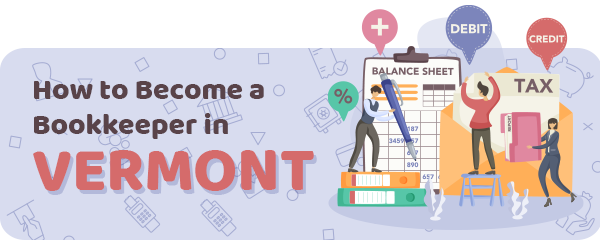Curious about being a bookkeeper in Vermont?
You’ve come to the right place!
We’ve got a handy guide on how to kickstart your career as a bookkeeper in this state.
Find out about the education and training needed, right here.
Keep reading for all the details!
Article Table of Contents
How to Become a Bookkeeper – Step by Step
Getting certified can help bosses trust you more, giving you more job choices.
You can become licensed by:
- Studying
- Getting real-world experience
Both options have similarities, but they also have their own unique aspects.
Step 1 – Earn Your High School Diploma
If you want to become a bookkeeper, you will need to finish high school and get a diploma.
You could also get a GED if completing high school is not doable at the moment.
Whatever you choose, you do need a diploma before continuing to the next step.
Step 2 Education – Earn a Degree
Considering further education is a smart choice.
Having a degree can boost your skills and unlock better job prospects in the future.
Many companies prefer candidates with some formal training.
The Bureau of Labor Statistics (BLS) suggests that pursuing a degree is beneficial for those interested in education.
When it comes to degrees, you have 3 to choose from:
- Associate’s Degree
- Bachelor’s Degree
- Master’s Degree
Even if a master’s degree isn’t on your radar, it’s good to know what it entails.
Now, let’s explore the bookkeeping programs offered in Vermont.
Step 3 Education – Train on-the-job
The beginning is all about training, and it’s super important to kick things off on the right foot.
For six months, you’ll be learning on the job.
During this period, you’ll mainly focus on grasping how things work, even if you won’t be doing them immediately.
If you choose education, getting good at using the company’s software is key.
You’ll also get the hang of carefully checking the company’s transactions.
Step 2 Practice – Gain Experience
If you decide to learn while on the job, you get to pick your license too.
You’ve got two options:
- You can go for a license from the American Institute of Professional Bookkeepers (AIPB), which needs 2 years of experience.
- You can aim for certification from the National Association of Certified Public Bookkeepers (NACPB), which only needs 1 year of experience.
Step 3 Practice – Earn the Credentials
Whichever license you pick, it works everywhere in the USA.
To get it, you have to pass four tests.
If you’re aiming for two licenses, that’s eight tests altogether.
These tests take place at Prometric centers, which are likely nearby.
You can’t use your books for the first set of tests, but you can for the second set.
The best part? You can begin working on getting licensed while still in school.
Once you’re certified, it lasts for a year.
To stay certified, you have to take 24 more classes.
Bookkeeping Programs in Vermont
So what program for bookkeepers can you attend in Vermont?
Let’s find out!
Community College of Vermont 
This college offers a certificate program that helps students start jobs in bookkeeping.
They’ll learn about accounting, finance, banking, and analyzing financial data.
It also gets them ready for exams needed to get the NACPB’s Certified Public Bookkeeper license.
Plus, the courses can count towards the CCV Accounting A.S. or Professional Studies A.S. degrees.
After finishing the Bookkeeping certificate program, students will:
- Understand and use commonly accepted accounting rules and management ideas.
- Apply these principles to real-world accounting problems.
- Recognize important agencies and groups in the accounting field.
- Create precise financial documents and reports, and analyze them to understand their impact.
- Explore future education and career options in their chosen field.
J. Sargeant Reynolds Community College 
Through this community college, you have access to the Bookkeeping CSC training program.
In this case, CSC means Career Studies Certificate.
The program has a total of 29 credits to earn.
Upon completion of the program, you can take any of the exams offered by:
- Accreditation Council for Accountancy and Taxation, Accredited Tax Preparer (ATP)
- American Payroll Association, Fundamental Payroll Certification (FPC)
- American Institute of Professional Bookkeepers, Certified Bookkeeper (CB)
| School Name | Address |
|---|---|
| J. Sargeant Reynolds Community College | PO BOX 85622 Richmond, Virginia, 23285-5622 |
| Community College of Vermont | PO Box 489, Montpelier, VT 05601 |
Bookkeeper Salary in Vermont
Once you finish learning and training, it’s important to understand how much money you might make.
This can influence your choices.
For example, people who do bookkeeping in Vermont usually earn around $43,478 each year.
But remember, this number can change based on where you work and how much experience you have.
Check out the table below to see what you could earn.
Annual Salary Range:| Location | Avg. Annual Salary |
|---|---|
| Putney | $45,871 |
| Vernon | $45,472 |
| Hartland | $45,428 |
| Quechee | $45,428 |
| Reading | $45,428 |
| Hartford | $45,428 |
| Brattleboro | $45,251 |
| Marlboro | $45,118 |
| Belmont | $45,073 |
| Stamford | $45,029 |
Regional Salary in Vermont
| Region | Employed | Avg. Annual Salary | Avg. Hourly Pay | Top 10% Annual Salary | Bottom 10% Annual Salary |
|---|---|---|---|---|---|
| Burlington-South Burlington, VT | 1,240 | $53,030 | $25.49 | $69,560 | $37,350 |
* Employment conditions in your area may vary.
Frequently Asked Questions
What kind of hours do bookkeepers work in Vermont?
Most bookkeepers usually work 40 hours per week, but some opt for part-time hours.
However, as a professional bookkeeper, you might need to work overtime during periods like fiscal quarter or year-end closings, as well as during tax season.
What skills are needed by bookkeepers in Vermont?
To excel as a bookkeeper in Vermont, you need:
- Attention to detail
- Invoicing proficiency
- Critical thinking
- Strong organization
- Effective communication
- Efficient time management
Do we still need human bookkeepers in Vermont when the technology is so advanced?
Yes, even though technology has significantly impacted bookkeeping.
Yet, employers and clients still value bookkeepers’ essential organizational skills and meticulous attention to detail.
Tools like QuickBooks or Microsoft Excel have automated many manual entry tasks.
However, organizing, reporting, and using financial data still heavily depend on human input and processing.
Read the full guide: How to Become a Bookkeeper


